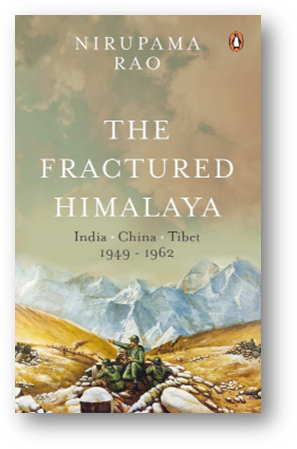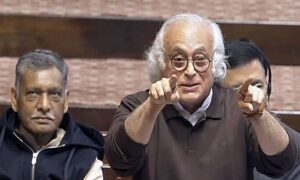
In the India-China relationship, the past shadows the present. It shapes current policy options and approaches, and strongly influences public debate in India to this day. While the period from 1949 to 1962 is crucial as Jawaharlal Nehru sought–unsuccessfully–to establish a workable relationship with the Chinese, the pre-independence history of the British colonial government’s relations with Tibet, the genesis of the McMahon Line, Communist China’s military take-over and domination of Tibet, together with the unshakeable foundational belief amongst Indians that the Himalayas form the country’s sacred boundary, combined to powerfully impact India’s relations with China.
Nirupama Menon Rao, a former Foreign Secretary of India, unknots this intensely complex saga. Her telling is based not only on a wide selection of published documents and archival material from India, China, Europe and America, but also on a deep personal knowledge of China where she has served as India’s Ambassador. In addition, she brings a practitioner’s keen eye to the labyrinth of negotiations and official interactions that took place between the two countries from 1949 to 1962.
The Fractured Himalaya is a rigorous examination of the workings of diplomacy and both its human and policy quotient; it looks at inflection points when the trajectory of the relationship could have altered, but were missed. But, most unusually, it also tells the story of the personalities involved-Jawaharlal Nehru, Mao Zedong, Zhou Enlai and the 14th Dalai Lama-and their interactions as the tournament of those years unfolded and moved step by closer step to the conflict of 1962.
Praise
With elegance, authority and a prodigious amount of research, Menon Rao tells us how a mountainous wasteland in the Himalayas once viewed as just a “blank place on the map” became a field of combat between India and China in 1962. As the two nations find themselves again in conflict, hers is a cautionary tale worth heeding. – Orville Schell, Arthur Ross Director, Center on US-China Relations, The Asia Society, New York
Ambassador Nirupama Rao has written a brilliant and fascinating narrative of India’s road to war with China in 1962. In this tragic decade-long saga of missed opportunities, with each side misreading the other, Ambassador Rao has mined the archives to disentangle the complicated story of how minor divisions and disagreements between these two countries that would have been easy to resolve early on were allowed to fester and grow, until they culminated in an unnecessary and fruitless war, which left both sides diminished. This is a book full of profound and revealing insights about the making of foreign policy, constant reminders that even the wisest of statesmen can find themselves blinded by hope and fall prey to their own illusions. –Liaquat Ahamed, Award-winning Author, “Lords of Finance: The Bankers Who Broke the World” (Pulitzer Prize for History, 2010)
A rare gem of a book that combines deep scholarship with felicitous writing. Nirupama Menon Rao’s unique knowledge and experience brings to life and makes accessible the important triangular interplay between India, Tibet and China which had such significant effects on all three polities and peoples, and on Asia as a whole, which still resonate to this day. As relations between the three polities are being recast and contested again, there is no better guide than Nirupama Rao to show us how the past illuminates the future. Her book is essential reading for an understanding of this part of the world. – Shivshankar Menon , former National Security Adviser, India and Foreign Secretary, and author
In “The Fractured Himalays” Nirupama Menon Rao has written a compelling, insightful, detailed history of how India and newly-Communist China dealt with one another in their earliest years, from the friendship of the early 1950s to the 1962 war. Her account is full of insights about the leading figures, from Nehru to Sardar Patel in India to Mao Zedong and Zhou Enlai to, above all, the current Dalai Lama, whom the author interviewed at length about Tibet in the 1950’s and the sequence of events leading up to his flight from Lhasa. This is both an authoritative history and a smooth-reading narrative. — James Mann, former China correspondent for the Los Angeles Times, author of three books about the United States and China.
In her book, Ambassador Nirupama Rao draws on an unprecedented diversity of sources, primary and secondary, to provide amazing breadth of analysis and insight on the history of India’s relations with China covering the period from 1947 to 1962. Rao is erudite, multi-textured and highly nuanced. Her sensitive and balanced portrayal of the complex relationships between various key actors during this complicated period of Asia’s early post-colonial history is truly impressive. A definitive work. – Vijay Nambiar, Indian diplomat, Chef de Cabinet to the U.N. Secretary-General, Ban Ki Moon, and a former Indian Ambassador to China
“Anyone who wishes to understand the geostrategic complexities of the high Himlayas and the origins of the India-China rivalry must read this book. An extraordinary work of historical scholarship, which richly sourced based on a range of government archives and interviews with key players, Ambassador Nirupama Rao’s expose is elegantly written and offers nuanced texture to the origins of Sino-Indian frictions during the 1950s-1960s that still resonate today. Not only are the territorial, border, diplomatic, and security dimensions carefully dealt with, but she reveals the centrality of the Tibet issue (which is not well understood). A signal accomplishment that should be carefully read by all concerned.” —Professor David Shambaugh, George Washington University, and author of China’s Leaders: From Mao to Now
About the Author
Nirupama Menon Rao is a former Indian Foreign Secretary (2009-2011) and was Ambassador of India to China (2006-2009) and to the United States (2011-2013). She was High Commissioner of India to Sri Lanka from 2004 to 2006 and also served as Spokesperson of the Ministry of External Affairs from 2001 to 2002. During her diplomatic career, she spent significant time working on the bilateral relationship between India and China and specialized on the history and problems concerning the India-China border, and the question of Tibet. In retirement, she has taught at Brown and Columbia Universities, and was a Pacific Leadership Fellow at the University of California at San Diego. She is currently a Global Fellow at the Woodrow Wilson Center in Washington D.C. Rao is also the founder of the South Asian Symphony Orchestra, a project to promote dialogue and habits of cooperation among young South Asians and the South Asian diaspora, through music.
Book Releasing : October 2021
[the_ad id=”41103″]


















